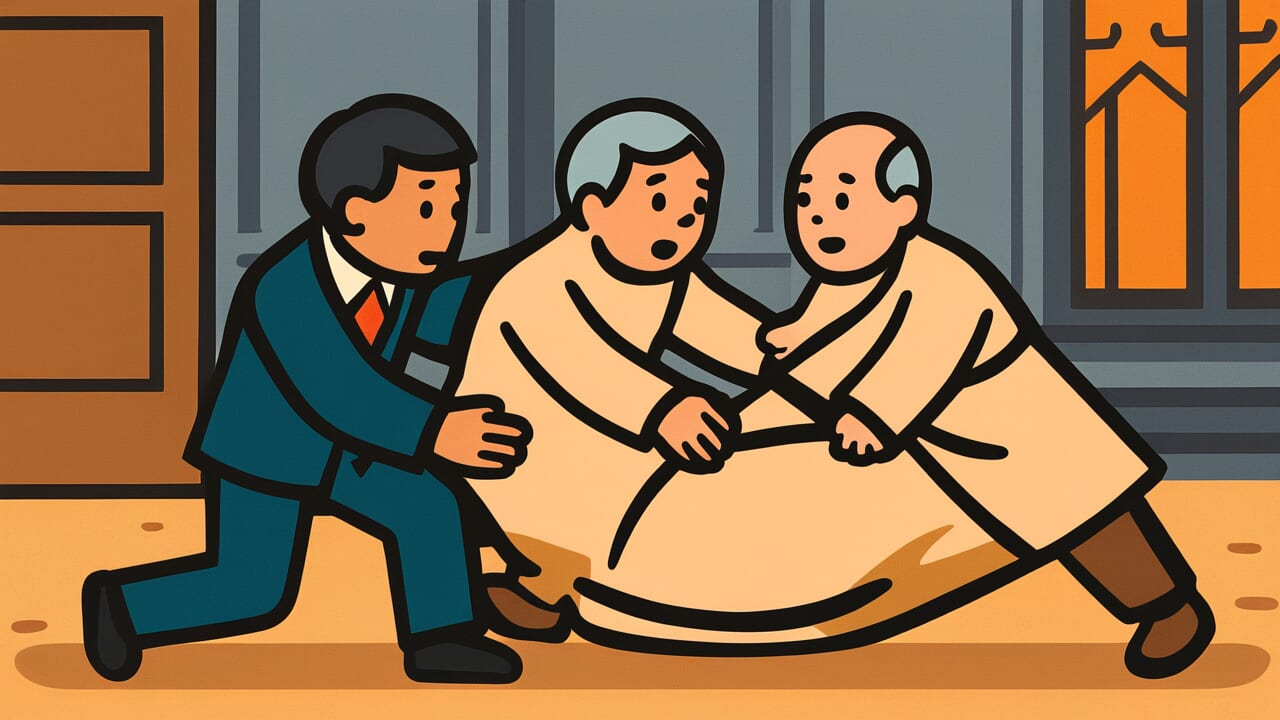How to Read “Ruining one’s master out of devotion”
Oyaomoi no shudaoshi
Meaning of “Ruining one’s master out of devotion”
“Ruining one’s master out of devotion” means pushing yourself too hard out of love for your parents until you collapse.
Being devoted to your parents is beautiful. But when you sacrifice your health and life too much, you end up making your parents sad instead.
This proverb warns against situations where people exhaust themselves caring for elderly parents or providing financial support.
It also applies when someone tries too hard to meet their parents’ expectations and loses their mental and physical balance.
In modern times, this proverb has become more relevant with aging society issues. The feeling of caring for your parents is precious.
But if you’re not healthy yourself, you can’t support your parents for long. The proverb teaches balanced devotion.
It shows the importance of maintaining appropriate distance and taking care of yourself too.
Origin and Etymology
No clear written records explain the origin of this proverb. However, we can make interesting observations from how the phrase is constructed.
Let’s focus on the word “master” (shu). Today it usually means “master” or “leader.”
But in ancient times, it was also used to mean “oneself.” So “ruining one’s master” actually means ruining yourself.
This expression likely emerged during the Edo period under the influence of Confucian thought.
Devotion to parents was considered the most important virtue. Sacrificing yourself for your parents was seen as admirable.
However, some people damaged their health and lives through excessive devotion. This proverb arose from observing such cases.
What’s interesting is that this proverb doesn’t reject devotion to parents. It recognizes that caring for parents is noble.
But it also shares practical wisdom: “If you collapse, everything is lost.” It’s a balanced teaching that encourages devotion while showing its limits.
The fact that such a warning proverb was created suggests many people actually did collapse from overexertion.
Usage Examples
- Taking on all the caregiving alone and collapsing is truly “ruining one’s master out of devotion”
- I understand wanting to be devoted, but if you increase your financial support until you can’t survive, it becomes “ruining one’s master out of devotion”
Universal Wisdom
The proverb “Ruining one’s master out of devotion” contains deep insight into the nature of human love.
The desire to devote yourself to someone you love is one of humanity’s most beautiful emotions.
The wish to repay your parents especially moves many hearts. But this proverb teaches that love has appropriate forms.
What’s interesting is that the proverb doesn’t say “don’t be devoted to your parents.” It actually affirms the feeling of caring for parents.
The problem is how you express that love. Sacrificing yourself too much may not be true love after all.
Why? Because if you collapse, your parents will be the saddest of all.
Parents wish for their children’s happiness. Seeing their child suffer for their sake is the greatest pain for parents.
In other words, taking care of yourself is actually part of being devoted to your parents.
This proverb has been passed down for so long because humans tend to become too self-sacrificing out of love.
Actions that begin with good intentions can create tragedy instead. This is a contradiction.
Our ancestors understood this human tendency. They tried to convey the importance of balancing love with self-preservation.
True love may come from a mature heart that values not only the other person but also yourself.
When AI Hears This
Devotion to parents, a well-intentioned action, actually changes the other person’s behavior and ultimately causes loss for both sides.
This can be understood as a variation of the “prisoner’s dilemma” in game theory.
In the normal prisoner’s dilemma, mutual cooperation would produce the best result. But people can’t trust each other and betray one another instead.
This proverb shows the opposite pattern. When a child continues devoting themselves to their parents, the parents update their expectations.
They learn “this child will always prioritize me no matter what.” The child’s cooperative behavior teaches the parents a betrayal strategy of “I can demand more.”
Behavioral economics calls this “moral hazard.” Just as having insurance makes people less careful, guaranteed devotion from children makes parents lose consideration for their master.
The child keeps cooperating for the parents’ sake. But that very behavior distorts the parents’ judgment.
Eventually it angers the master and destroys the whole family.
What’s fascinating is this: if the child had taken a “moderate devotion” strategy from the start, the parents likely would have maintained realistic judgment.
Perfect good intentions change the other person’s behavior patterns and create the worst outcome nobody wanted.
This shows that even good intentions have an optimal “amount.” It’s a lesson in systems thinking.
Lessons for Today
What this proverb teaches modern people is this truth: “Taking care of yourself is not selfish.”
In modern society, there are many situations where you work hard for someone else.
Caring for family, taking responsibility at work, being considerate in relationships. Do you ever put your own care last in these situations?
But if you collapse, what happens to the people who need you?
What matters is having a long-term perspective. You might be able to push yourself for just one day.
But life is a long journey. Like a marathon, you need to think about pacing yourself.
Specifically, develop a habit of regularly checking your own condition. Ask yourself: Am I tired? Am I pushing too hard?
And have the courage to rest when necessary. That’s not laziness at all.
It’s a wise choice that lets you support someone for a long time.
Your health and happiness connect to the happiness of those around you. Taking care of yourself ultimately means taking care of the people you love.



Comments